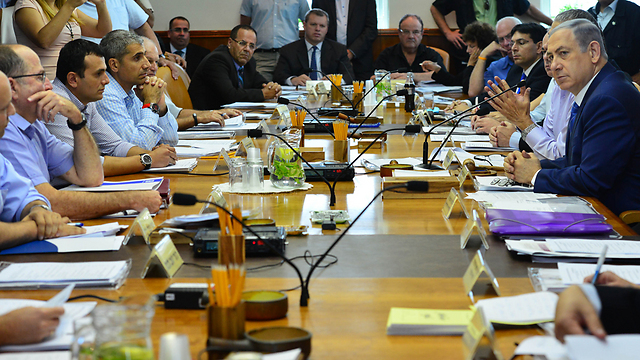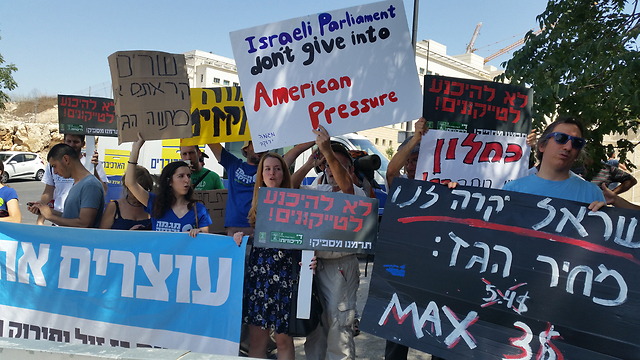
Government approves new gas plan
Gas plan proposed by Energy Minister Yuval Steinitz passes government vote; Ministers Kahlon, H. Katz, and Galant unable to vote on the plan due to conflict of interests.
Three ministers did not vote on the proposed gas plan due to possible conflicts of interest: Finance Minister Moshe Kahlon, because of his close personal relationship with Isramco head Koby Maimon (one of the gas plan's possible beneficiaries), Welfare Minister Haim Katz, who holds shares of involved companies, and Construction Minister Yoav Galant, who served as CEO of a related gas company in the recent past.
Knesset approval of the plan will likely have to wait. Knesset employees will be sent on a concentrated leave of absence starting Monday and ending in late August, a leave that is unlikely to be interrupted. The next possible occasion for the vote is September 2nd, when the Knesset will assemble for the first round of budget approval votes, but assumptions are that it would be highly difficult to schedule two such dramatic votes for the same day.
The Knesset can assemble at any point if demanded by at least 25 MKs, but it is likely that a gas plan vote will wait until the Knesset's next regularly-scheduled assembly, in mid-October.
Most of the political system's attention is pointed at the new gas price determination structure, which seems to be a difficult source from which to predict gas and electricity prices in the next few decades. According to the current plan, the companies owned by Yitzhak Tshuva will sell their share of the Tamar, Karish, and Tanin Gas Fields within six years, and Noble Energy will dilute its share in the Tamar field in return for 25 percent. Up until that point, gas prices will be supervised. In addition, the proposed agreement includes a commitment to develop the Leviathan field before 2019.
Meanwhile, an economic opinion paper submitted to the government predicts that the tax income resulting from the sale of gas will be lower that predicted, reaching approximately $100 billion in the next few decades - about $20-$30 billion less than previous government and Bank of Israel estimates.
The opinion paper was written by National Economic Council deputy head Morris Dorfman, one of the people behind the gas plan. He mentioned that the importance of working alongside the gas companies is mostly legal, "A lack of agreement will bring about a significant delay in gas deposit development, among other reasons because of the long litigation process that would be expected to follow the application of antitrust law."
Dorfman did not specify what legal proceedings would take place if the government were to act on its own accord, which courts would they take place in, or whether the state would have good arguments in these proceedings.
The implied assumption that concerns of the process' delay implies is of the need to quickly develop most of the gas reserves, especially those in the Leviathan Gas Field, since development that is too slow will lead to a shortage in gas, and to the need for consumption of more expensive fuels.
However, Dorfman also mentions that the shortage is fairly small, and would reach up to 10 percent in 2021. Another reason for urgency is the fears that the use of expensive fuels and the delay in tax income from gas sales will hurt the national economy, but Dorfman's paper indicates that this impact will be limited.
Dorfman also estimates in the paper that the loss of tax income from gas sales in the event of a delay in development is predicted to start in 2019, and would rise gradually: $100 million in the first year, and up to $1.7 billion in 2023. Accounting for the use of alternative fuels, a one year delay in Leviathan's development will cost up to $500 million, a delay of three years will cost up to $1.8 billion, and an especially long five year delay would cost up to $3.4 billion. In the end, the economic impact of the delay on the market as a whole is limited, reaching less that 0.2 percent of GDP after three years.
This is why, Dorfman wrote, the most important argument for quick gas field development is the concern about Israel's dependence upon a single gas field connected to land by a single pipeline. He estimates that the damage to the markets as a result of technical failures or deliberate sabotage of the gas field will be over $12 billion a year, due to the need for more expensive alternative fuels. In addition, the environmental impact and possible electricity shortages during times of peak demand are also a concern.
Shaul Amsterdamski, Moran Azulay, Roi Yanovsky contributed to this report.












